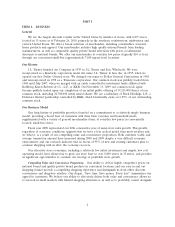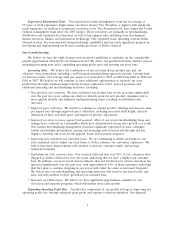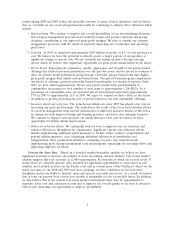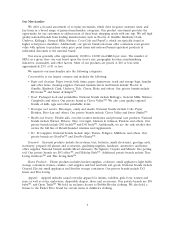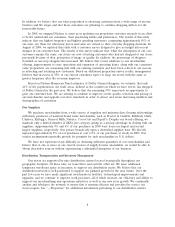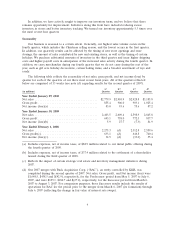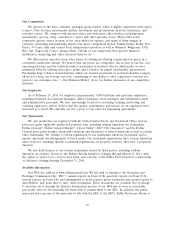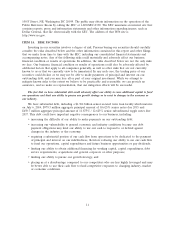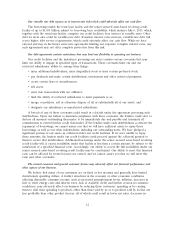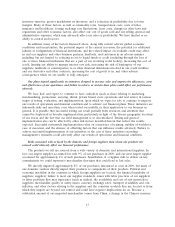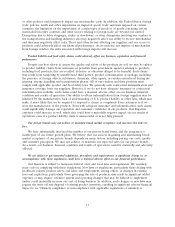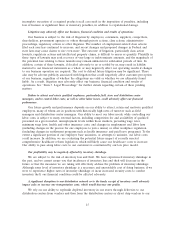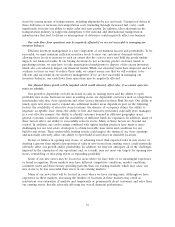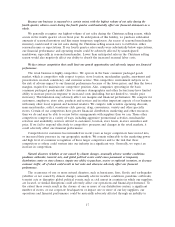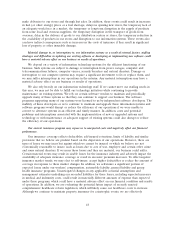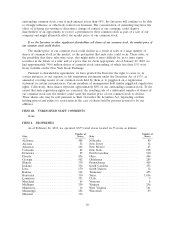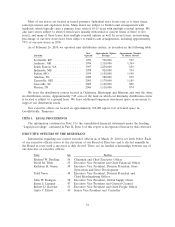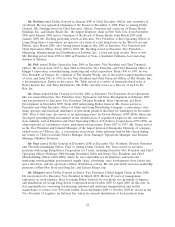Dollar General 2009 Annual Report Download - page 23
Download and view the complete annual report
Please find page 23 of the 2009 Dollar General annual report below. You can navigate through the pages in the report by either clicking on the pages listed below, or by using the keyword search tool below to find specific information within the annual report.Our variable rate debt exposes us to interest rate risk which could adversely affect our cash flow.
The borrowings under the term loan facility and the senior secured asset-based revolving credit
facility of up to $1.031 billion, subject to borrowing base availability, which matures July 6, 2013, which,
together with the term loan facility, comprise our credit facilities, bear interest at variable rates. Other
debt we incur also could be variable-rate debt. If market interest rates increase, variable-rate debt will
create higher debt service requirements, which could adversely affect our cash flow. While we have
entered and may in the future enter into agreements limiting our exposure to higher interest rates, any
such agreements may not offer complete protection from this risk.
Our debt agreements contain restrictions that may limit our flexibility in operating our business.
Our credit facilities and the indentures governing our notes contain various covenants that may
limit our ability to engage in specified types of transactions. These covenants limit our and our
restricted subsidiaries’ ability to, among other things:
• incur additional indebtedness, issue disqualified stock or issue certain preferred stock;
• pay dividends and make certain distributions, investments and other restricted payments;
• create certain liens or encumbrances;
• sell assets;
• enter into transactions with our affiliates;
• limit the ability of restricted subsidiaries to make payments to us;
• merge, consolidate, sell or otherwise dispose of all or substantially all of our assets; and
• designate our subsidiaries as unrestricted subsidiaries.
A breach of any of these covenants could result in a default under the agreement governing such
indebtedness. Upon our failure to maintain compliance with these covenants, the lenders could elect to
declare all amounts outstanding thereunder to be immediately due and payable and terminate all
commitments to extend further credit thereunder. If the lenders under such indebtedness accelerate the
repayment of borrowings, we cannot assure you that we will have sufficient assets to repay those
borrowings, as well as our other indebtedness, including our outstanding notes. We have pledged a
significant portion of our assets as collateral under our credit facilities. If we were unable to repay
those amounts, the lenders under our credit facilities could proceed against the collateral granted to
them to secure that indebtedness. Additional borrowings under the senior secured asset-based revolving
credit facility will, if excess availability under that facility is less than a certain amount, be subject to the
satisfaction of a specified financial ratio. Accordingly, our ability to access the full availability under our
senior secured asset-based revolving credit facility may be constrained. Our ability to meet this financial
ratio can be affected by events beyond our control, and we cannot assure you that we will meet this
ratio and other covenants.
The current recession and general economic factors may adversely affect our financial performance and
other aspects of our business.
We believe that many of our customers are on fixed or low incomes and generally have limited
discretionary spending dollars. A further slowdown in the economy or other economic conditions
affecting disposable consumer income, such as increased unemployment levels, inflation, increases in
fuel or other energy costs and interest rates, lack of available credit and further erosion in consumer
confidence, may adversely affect our business by reducing those customers’ spending or by causing
them to shift their spending to products other than those sold by us or to products sold by us that are
less profitable than other product choices, all of which could result in lower net sales, decreases in
12


